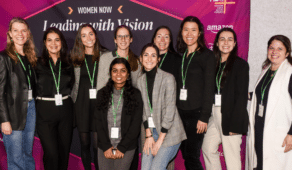What’s Next For Digital Advertising Trends In 2021?
This past year was unlike anything the advertising industry has ever experienced. While we’re still catching our collective breath from the year that passed, it’s time to look ahead to 2021. On Dec. 17, Dstillery hosted a webinar, 2021 Digital Advertising Forecast & Predictions, a three-way conversation between Dstillery CEO Michael Beebe and Chief Data Scientist Melinda Han Williams, along with Brian Wieser, Global President – Business Intelligence at GroupM, the world’s leading media investment company.
What follows are highlights from the session, focusing on what advertisers and agencies should expect for digital advertising in 2021 after a year of major disruption. You can also watch the video recording here.
2021 will feel a lot like 2020
That is, at least at the start of the year. Much of this year’s tumult will carry over into 2021 as we deal with the global Covid health crises and connected changes on consumer behavior. The year will be marked by disruption as we prepare for a post-cookie future, and the entire industry will ramp up its preparations for the demise of the third-party cookie, which is expected in 2022.
The new year will also carry some of 2020’s silver linings. “It’s bad, but it really could’ve been worse,” said Wieser, reflecting on 2020. Indeed, the disruption of 2020 inspired a great deal of business transformation across verticals, driven by e-commerce. Wieser pointed out that many categories that previously didn’t do much business online were suddenly seeing massive e-commerce growth, and that should continue into the new year.
Data-driven marketing is a must-have, even as cookies disappear
The past 12 months forced a lot of brands to get even better at using data in order to target their marketing and advertising dollars. “That goes hand in hand with the shift toward e-commerce,” said Beebe. “Even companies and brands that have been beholden to retail for their distribution, we saw a lot of activity from those types of brands in terms of developing a more data-driven consumer-direct strategy around how they spend their budgets and target their marketing dollars.”
These brands saw the real benefits of using more data to drive outcomes, and we should expect them to continue exploring data in 2021 and into the future. This is all the more important in the lead-up to 2022, and the end of the cookie era.
“Cookies could go away, and marketers will find something else to work with,” Wieser said. “They’ll find other approaches to buy the best audience relative to the next best alternative approach, to accomplishing whatever their goal is. There are other signals out there.”
Future growth for AI & analytics
As marketers look toward a cookie-less future, they’re wondering how best to use the available data to maximize efficiency and targeting. One method that’s garnered a lot of buzz is through AI. But AI isn’t necessarily a cure-all so much as it is a tool for accomplishing a goal.
“Every marketer should take a step back and know what’s possible with data and what’s possible with AI,” said Wieser. “What’s the business goal, marketing strategy, what could it be, how could we think about people differently? It might be lower fidelity data you’re going to work with, and it could be far more powerful. We should keep that in mind.”
Indeed, all three participants agreed that there’s no purpose in processing more data for its own sake. Dstillery has long held that marketers should be very deliberate about how they apply their data and analytics. “I can make a model that’s super good at predicting clicks, and your clicks will be off the chart and it’s so great. And so I win, right? But actually, the brand doesn’t win in the end if it’s not related to the real goals that the brand is trying to drive at a higher level,” said Williams.
The quality of data simply matters more than the quantity, and this will be especially important for digital marketers in 2021 and beyond. “You have to know what you’re looking for,” said Beebe.


